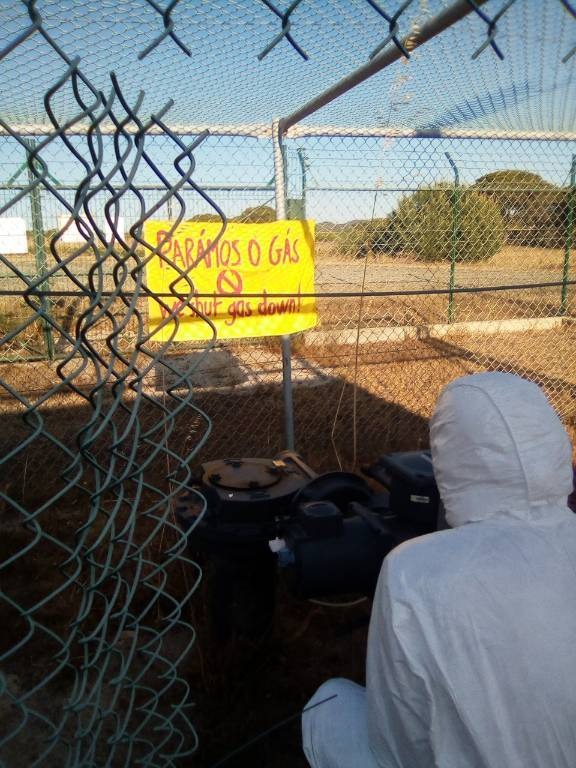Actuamos en diez campos de golf en seis provincias españolas, con el objetivo de denunciar el despilfarro de agua que supone el golf en medio de una de las peores sequías de la historia.
Author: climatedefense1
+++ Parar o Gás (Stop Gas) mobilize hundreds of people to block an LNG terminal +++ Protestants turn off the gas valve connecting the harbor to the gas pipeline.
On the 13th of May hundreds of activists gathered at the liquidfied natural gas (LNG) terminal of the harbor of Sines, a town in the Alentejo region of Portugal. This terminal is the entry place of most of the fossil gas that arrives to the country. Activists stoped the normal functioning of the harbor for more than 7 hours by blocking all land entry points, blocking the entrance of boats by having their own boats at sea. The emergency gas valve was also closed, stoping fossil gás from entering the pipeline.
This multipronged blockade of the LNG Terminal organized by the campaign Parar o Gás (Stop Gas) was done in order to fight for energy as a right, for an energetic transition and for the end of fossil colonialism.
Movimento pela justiça climática parou o gás fóssil e lança próximos passos, declarando que este será o último inverno de gás.
No dia 13 de Maio, 200 pessoas de todo o país travaram o funcionamento do Terminal de Gás Liquefeito (GNL) no porto de Sines durante 7 horas. Apoiantes de Parar o Gás fecharam a norte a válvula de emergência do gasoduto que sai do terminal com as suas próprias mãos, travando a saída de gás do terminal via gasoduto. No mar foi bloqueada a entrada dos barcos no terminal GNL e por terra foram bloqueados todos os portões de entrada desta infraestrutura, impedindo assim a entrada e saída de qualquer transporte com gás. A indústria fóssil não é imparável e as ativistas anunciaram que irão continuar a bloquear e fechar a torneira de gás até este ser parado – este tem de ser o último inverno de gás.
Bloqueio por mar e terra do Terminal da REN: Parar o Gás é lutar por energia como um direito, por uma transição energética e pelo fim ao colonialismo fóssil.
++ Les Soulèvements de la Terre mobilize 30 000 people against the mega-basins ++ Protestants sucessfully disarmed a water pump ++ 200 protests harmed by the violent police repression

Les Soulèvements de la Terre are currently in their 5th season of actions, having done their first one on the 25th and 26th of May. This action, happening in Sainte-Soline against the construction of so-called mega-basins, was supported by more than 100 organizations, including Confédération paysanne, Bassines Non Merci and Soulèvements de la Terre. Together they mobilized 30 thousand people who gathered at Sainte-Soline and where met by the violent repression of the state, 3200 people strong. From that encounter, 200 protestants were harmed with the police actively repressing the arrival of medical help.
Ce qui s’est vraiment passé à Sainte-Soline malgré les mensonges de la préfecture et du ministre de l’Intérieur – Les Soulèvements de la Terre
Le lendemain de cette journée de mobilisation historique contre les méga-bassines, la Confédération paysanne, les Soulèvements de la Terre et Bassines Non Merci tiennent à rappeler les faits. Alors que des intox sont affirmées au plus haut niveau de l’Etat, nous avons vu et pouvons prouver
Une mobilisation historique de 30 000 personnes

Le lendemain de cette journée de mobilisation historique contre les méga-bassines, la Confédération paysanne, les Soulèvements de la Terre et Bassines Non Merci tiennent à rappeler les faits. Alors que des intox sont affirmées au plus haut niveau de l’Etat, nous avons vu et pouvons prouver
Une mobilisation historique de 30 000 personnes
30 000 personnes manifestent à Sainte-Soline malgré la brutalité policière pour une avancée déterminante vers la fin des méga-bassines – Les Soulèvements de la Terre
Ce samedi 25 mars, c’est plus de 30 000 personnes qui se sont réunies près de Sainte-Soline à l’appel de la Confédération paysanne, Bassines Non Merci et les Soulèvements de la Terre mais aussi de plus de 100 organisations associatives et syndicales pour enfoncer le clou d’une mobilisation populaire grandissante et mettre un terme aux chantiers de méga-bassines.

La veille, le mouvement contre les méga-bassines avait déjà relevé le double défi d’installer un campement au petit matin à quelques encablures de la bassine de Sainte-Soline, puis de faire passer le convois de tracteurs de la Confédération paysanne en contourné les barrages policiers à travers champ pour rejoindre le campement.
Towards the world we want to live in: blow up or shut down? – Sam Albert
Are public disruption and (infra)structural disruption opposing or complementary ways forward for the climate justice movement?
The fight for a better world, and more particularly, the fight for an habitable on, where the climate crisis is held at bay, is being fought by different kinds of people with different ideas on how this should be done. The ecosystem of Climate Movement, of which the Climate Justice movement is a part of, is so diverse because this seems to be a precondition for success, as any struggle that is too narrow, and focuses too strongly on a specific way of fight seems doomed to not be able to completely change the world.
The diversity of background, ideas and tactics is welcomed in the Climate Justice movement, but this inevitably leads to moments of tension, specially when the way that some groups do their action is so radically different from the way that other groups see the way forward is that they assume that it is actually done against the benefit of the whole movement. One such recent example is the infamous soup throwing of the UK based group “Just Stop Oil”, which lead to many public discussions, on whether this type of protest should be ignored or if they were doing any favors to the climate movement. During the following weeks, active members and participants in climate justice organizing were discussing internally exactly the same points which comes to show the effectiveness of this actions that has now been reproduced in other countries like Germany, Italy and the Netherlands.
In a pre-pandemic world the same had happened with the continued public disruption brought forward by Extinction Rebellion (XR) on their first mass actions. The question of whether it was justified to breakout from regular climate protests and not only disrupt public live in a legal and controlled manner, but organized marches and strikes, but to go the step beyond to block streets, bridges, trains and highways, as to make people completely unable to ignore what you are doing while at the same time be ready to get arrested was very controversial. Antagonizing the general public seemed to be the opposite of what the climate marches had in mind, to become more broad and to involve more and more different sector of society, and these “radical” actions of XR where shun upon by some, less radical, circles in the climate movement.
Continue reading “Towards the world we want to live in: blow up or shut down? – Sam Albert”
A year of escalation and experimentation for the climate movement – Sam Albert
There seem to be two strands within the climate movement that lead to new tactics being experimented: the frustration strand and the strategic escalation strand.
On 17 February 2022, a group of twenty people entered the construction site of the Coastal GasLink pipeline in British Columbia, and destroyed machinery and equipment. The controversial pipeline is expected to carry 60 million cubic meters of natural gas daily and passes through land belonging to the Wet’suwet’sen nation. The company reported millions in damage after the action.
In March 2022, activists in the United Kingdom deflated the tyres of 40 SUVs. Connected through the Tyre Extinguishers network, the actions got stronger throughout the year: September saw 600 SUVs targeted in the UK, France and Canada in one night; and by November the group organized a day of action that disarmed 900 SUVs in eight countries. The Tyre Extinguishers underline that if all SUV drivers banded together to form their own country, it would rank as the seventh largest emitter in the world.
In December 2022, around two hundred activists occupied the Lafarge cement factory in Marseilles and “disarmed” the incinerator, electrical devices and cables, as reported by Les Soulèvements de la Terre. They underlined that it is one of the biggest emitters in France.
These are but a few examples of climate groups aiming at sustained and enhanced disruption in their actions. In comparison to the die-ins and marches of 2019, a clear shift is visible. How can we understand this change in the last years?
Continue reading “A year of escalation and experimentation for the climate movement – Sam Albert”
